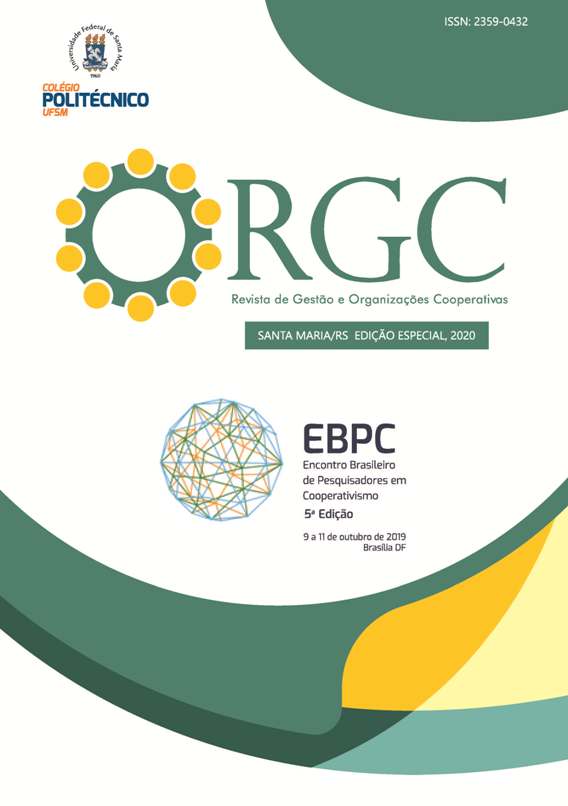The cooperative as a generator of social changes: a study about the 6th Week of Financial Education in the city of Itamaraju/BA
DOI:
https://doi.org/10.5902/2359043241725Keywords:
Cooperation, Education, Change, Development, FormationAbstract
The present article discourses about the Cooperative Principles constituents to the systems of cooperation, emphasizing the Principles of Education, Formation and Information and the Public Interests. In this sense the pointed out problem is how the cooperative education may contribute to children's formation and change in the way of thinking about the development of financial education? Thus the presented goals are: analyse cooperative education and its contribution on the change in the way of thinking of children about the development of financial education and the specific goals are contextualize the Cooperativism in Brasil and around world; understand the process of financial education in the school scope and exemplify the Financial Education Week proposed by the Central Bank and performed by the Sicoob Institute. The methodology developed in the research has a qualitative and quantitative approach. Being represented by bibliographic research and field research, describing a short historical sight about cooperativism, education and society.Downloads
References
ABRANTES, José. Associativismo e Cooperativismo: como a união de pequenos empreendedores pode gerar emprego e renda no Brasil. Rio de Janeiro: Interciência, 2004. p. 35-54.
CAMPOS, Dinah Martins de Souza. Psicologia da aprendizagem. Petrópolis: Editora Vozes, 2000
CENZI, Nerii Luiz. Cooperativismo: Desde as origens ao projeto de lei de reforma do sistema cooperativo brasileiro. Curitiba: editora afiliada, 2009. p 29.
CLASON, George S. O homem mais rico da Babilônia. 18 ed. Rio de Janeiro, RJ. Ediouro, 2005.
COUTO, Eduardo Andrade. Princípios cooperativistas na prática: análise de gestão social da COOPVALI/BA. Vila Velha: Opção Editora, 2014.
DOMINGOS, Reinaldo. Educação financeira e finanças pessoais: qual a diferença? Disponível em: https://www.dsop.com.br/blog/educacao-financeira-e-financas-pessoais-qual-a-diferenca Acesso em: 16 out. 2019.
DURKHEIM, Émile. As regras do método sociológico. São Paulo: Martin Claret, 2001.
GIL, Antonio Carlos: Como elaborar projetos de pesquisa. São Paulo: Atlas, 2017.
HAIRE, Mason. Psicologia aplicada a administração. São Paulo: Livraria Pioneira Editora, 1974.
JAKOBSEN, G. When business leads to cooperative development: a study ofeducational processes in a cooperative firm. In: Review of International Cooperation. v. 89/2, p. 25-33, 1996.
LAKATOS, E. M.; MARCONI, M. A. Metodologia do trabalho científico. São Paulo: Atlas, 2001.
OCDE. Recommendationon Principles and Good Practices for Financial Education and Awareness. Paris, 2005. Disponível em: http://www.oecd.org/ daf/fin/financial-education/35108560.pdf. Acesso em: 03 junho 2019.
PELLI, Gabriela. Caio achou uma moedinha. Brasília: Instituto SICOOB.
PRESTES, Maria Luci de Mesquita. A pesquisa e a construção do conhecimento científico: do planejamento aos textos, da escola à acadêmica. São Paulo: Editora Rêspel LTDA, 2005.
PRESTES, Maria Luci de Mesquita. A pesquisa e a construção do conhecimento científico: do planejamento aos textos, da escola à academia. São Paulo: Respel editora, 2005. p. 27.
PINHO, Diva Benevides. O Cooperativismo no Brasil: da verdade pioneira à vertente solidária. São Paulo: Saraiva, 2004.
RIOS, Gilvando Sá Leitão. O que é Cooperativismo. São Paulo: Brasiliense, 2007
SAVIANI, D. Escola e democracia. 24. ed. São Paulo: Cortez, 1991. p. 55.
SEBRAE, Revista Cooperativa de Crédito. 2009
SILVA, Eduardo D. Gestão em Finanças Pessoais: uma metodologia para se adquirir educação e saúde financeira. Rio de Janeiro: Quatymark, 2004.
Downloads
Published
How to Cite
Issue
Section
License
Authors who publish in this journal agree to the following terms:
- Authors retain copyright and grant the journal the right of first publication, with work simultaneously licensed under the Creative Commons Attribution License that allows the sharing of work with acknowledgment of authorship and initial publication in this journal.
- Authors are authorized to enter additional contracts separately for non-exclusive distribution of the version of the work published in this journal (eg, publishing in institutional repository or as a book chapter), with acknowledgment of authorship and initial publication in this journal.
- Authors are allowed and encouraged to post and distribute their work online (eg, in institutional repositories or on their personal page) at any point before or during the editorial process, as this can bring about productive change as well as increase impact and impact. citation of published work (See The Effect of Free Access).







